GALLUP NEWS SERVICE
PRINCETON, NJ -- In the wake of the intensive news coverage of American casualties in Iraq in the past couple of weeks, Americans have become somewhat more critical of the war than they were two weeks ago. Nevertheless, President Bush's approval rating remains steady at 45%, compared with 44% two weeks ago, and an average of 46.5% since June.
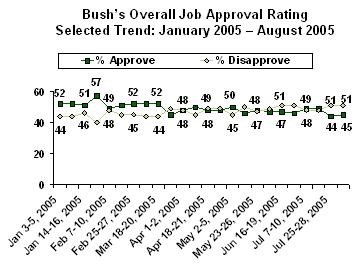
Today, 54% say the United States made a mistake in sending troops to Iraq, up from 46% who expressed that view in a July 22-24 poll, but not much different from a poll in late June.
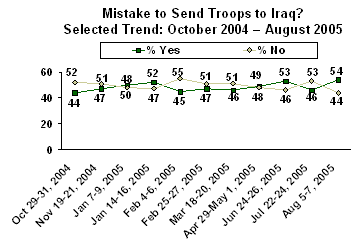
The view that it was a mistake to go to war in Iraq is reinforced by a separate question that asks if it was "worth going to war in Iraq or not." This question was asked of half the sample, while the other half of the sample was asked if "sending troops to Iraq" was a mistake. The same percentage, 54%, say that it was not worth going to war as say sending troops to Iraq was a mistake.
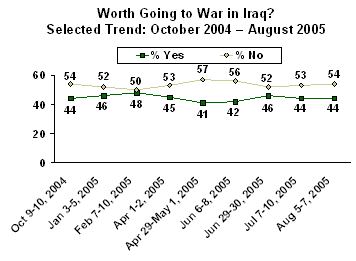
A majority of Americans have consistently said the war was not worth it since last October, although at the same time, Americans have not been as consistently willing to say sending troops was a mistake. Just before the presidential election last year, only 44% of Americans said it was a mistake, while 54% said it was not. Yet, at about the same time, a majority of Americans were also saying the war was not worth it.
One possible explanation for these findings is that the word "mistake" is a harsher judgment than "not worth it," and Americans were reluctant to make the harsher judgment. But the current poll suggests that in today's news environment, Americans are not as likely to hold back their criticisms.
On other questions, however, there is little change in the mostly negative perceptions about the war. A majority of Americans today say the war is going badly rather than well, by a 56% to 43% margin, not much different from what Gallup measured last May. Opinion was more positive after the elections in Iraq, but it has deteriorated to levels measured this past December and January.
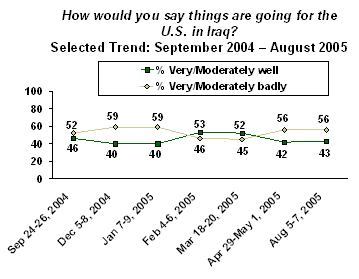
The most significant change in longer-term tracking of trends on Iraq was measured in a June 6-8 poll, when a solid majority of Americans, 59%, said the United States should withdraw some or all of its troops from Iraq. That was the first time Gallup had shown a substantial majority in favor of troop withdrawal.
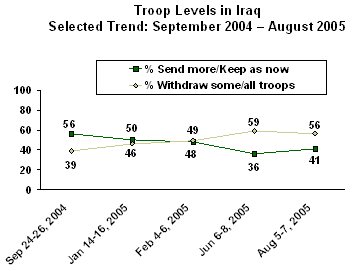
This month, the margin has tightened slightly, with 56% opting for troop withdrawal -- though the change is well within the poll's margin of error. Still, by a four-point margin, the 33% who say that the United States should withdraw all of its troops is the largest measured across the 15 times this question has been asked.
One of Bush's justifications for the war is that it would be less dangerous for the United States to fight terrorists in Iraq than to fight terrorists who come here. Generally, the polls have shown the public's agreement with that premise. However, in June 2004 and again in July and August of this year, clear majorities disagree. The current poll, and another a month ago, now show a clear majority saying the war in Iraq has made the United States "less safe" from terrorism.
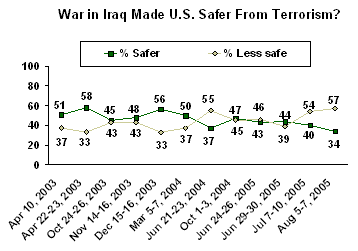
One argument is that while the Iraq war may make the world and the United States more susceptible to terrorist attacks in the short run, in the long run the Iraq war will make the country safer. The poll shows a divided public on this issue -- 48% disagree, but 42% agree.
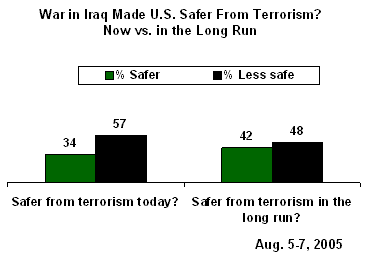
Survey Methods
Results are based on telephone interviews with 1,005 national adults, aged 18 and older, conducted Aug. 5-7, 2005. For results based on the total sample of national adults, one can say with 95% confidence that the maximum margin of sampling error is ±3 percentage points.
In addition to sampling error, question wording and practical difficulties in conducting surveys can introduce error or bias into the findings of public opinion polls.
10. In view of the developments since we first sent our troops to Iraq, do you think the United States made a mistake in sending troops to Iraq, or not?
BASED ON 481 NATIONAL ADULTS IN FORM A
|
Yes, |
No, not |
No |
|
|
Iraq |
% |
% |
% |
|
2005 Aug 5-7 ^ |
54 |
44 |
2 |
|
2005 Jul 22-24 |
46 |
53 |
1 |
|
2005 Jun 24-26 |
53 |
46 |
1 |
|
2005 Apr 29-May 1 ^ |
49 |
48 |
3 |
|
2005 Mar 18-20 ^ |
46 |
51 |
3 |
|
2005 Feb 25-27 |
47 |
51 |
2 |
|
2005 Feb 4-6 |
45 |
55 |
* |
|
2005 Jan 14-16 |
52 |
47 |
1 |
|
2005 Jan 7-9 |
50 |
48 |
2 |
|
2004 Nov 19-21 |
47 |
51 |
2 |
|
2004 Oct 29-31 ^ |
44 |
52 |
4 |
|
2004 Oct 22-24 |
47 |
51 |
2 |
|
2004 Oct 14-16 |
47 |
52 |
1 |
|
2004 Oct 9-10 ^ |
46 |
53 |
1 |
|
2004 Oct 1-3 |
48 |
51 |
1 |
|
2004 Sep 24-26 |
42 |
55 |
3 |
|
2004 Sep 3-5 ^ |
38 |
57 |
5 |
|
2004 Aug 23-25 ^ |
48 |
50 |
2 |
|
2004 Jul 30-Aug 1 |
47 |
51 |
2 |
|
2004 Jul 19-21 |
50 |
47 |
3 |
|
2004 Jul 8-11 ^ |
54 |
45 |
1 |
|
2004 Jun 21-23 ^ |
54 |
44 |
2 |
|
2004 Jun 3-6 ^ |
41 |
58 |
1 |
|
2004 May 7-9 ^ |
44 |
54 |
2 |
|
2004 Apr 16-18 ^ |
42 |
57 |
1 |
|
2004 Jan 12-15 ^ |
42 |
56 |
2 |
|
2003 Nov 3-5 ^ |
39 |
60 |
1 |
|
2003 Oct 6-8 ^ |
40 |
59 |
1 |
|
2003 Jul 7-9 ^ |
27 |
72 |
1 |
|
2003 Mar 24-25 ^ |
23 |
75 |
2 |
|
Afghanistan |
|||
|
2004 Jul 19-21 |
25 |
72 |
3 |
|
2002 Jan 7-9 |
6 |
93 |
1 |
|
2001 Nov 8-11 |
9 |
89 |
2 |
|
Yugoslavia |
|||
|
1999 Jun 4-5 |
43 |
53 |
4 |
|
1999 Apr 21 |
42 |
51 |
7 |
|
Persian Gulf War |
|||
|
1991 Jul 18-21 |
15 |
82 |
3 |
|
1991 Feb 28-Mar 3 |
10 |
87 |
3 |
|
1991 Feb 7-10 |
21 |
76 |
3 |
|
1991 Jan 30-Feb 2 |
18 |
80 |
2 |
|
1991 Jan 23-26 |
18 |
77 |
5 |
|
1991 Jan 17-20 |
16 |
80 |
4 |
|
1991 Jan 11-13 |
29 |
65 |
6 |
|
1991 Jan 3-6 |
30 |
61 |
9 |
|
1990 Dec 6-9 |
28 |
66 |
6 |
|
1990 Nov 29-Dec 2 |
29 |
66 |
5 |
|
1990 Nov 15-18 |
27 |
65 |
8 |
|
1990 Nov 8-11 |
27 |
68 |
5 |
|
1990 Nov 2-4 |
25 |
67 |
8 |
|
1990 Aug 30-Sep 2 |
16 |
76 |
8 |
|
1990 Aug 23-26 |
18 |
76 |
6 |
|
1990 Aug 16-19 |
17 |
75 |
8 |
|
1990 Aug 30-Sep 2 |
16 |
76 |
8 |
|
1990 Aug 23-26 |
18 |
76 |
6 |
|
1990 Aug 16-19 |
17 |
75 |
8 |
|
1990 Oct 25-28 |
24 |
71 |
5 |
|
1990 Oct 18-21 |
26 |
67 |
7 |
|
1990 Oct 11-14 |
27 |
68 |
5 |
|
1990 Oct 3-4 |
21 |
71 |
8 |
|
1990 Sep 27-30 |
20 |
73 |
7 |
|
1990 Sep 14-16 |
18 |
73 |
10 |
|
1990 Sep 10-11 |
19 |
76 |
5 |
|
Vietnam War |
|||
|
2000 Nov 13-15 |
69 |
24 |
7 |
|
1995 Apr 21-24 |
71 |
23 |
6 |
|
1990 Mar 15-18 |
74 |
22 |
4 |
|
1973 Jan 12-15 |
60 |
29 |
11 |
|
1971 May 14-17 |
61 |
28 |
11 |
|
1971 Jan 8-11 |
60 |
31 |
9 |
|
1970 May 21-26 |
56 |
36 |
8 |
|
1970 Apr 2-7 |
51 |
34 |
15 |
|
1970 Jan 15-20 |
57 |
32 |
11 |
|
1969 Sep 17-22 |
58 |
32 |
10 |
|
1969 Jan 23-28 |
52 |
39 |
9 |
|
1968 Sep 26-Oct 1 |
54 |
37 |
9 |
|
1968 Aug 7-12 |
53 |
35 |
12 |
|
1968 Apr 4-9 |
48 |
40 |
12 |
|
1968 Feb 22-27 |
49 |
42 |
9 |
|
1968 Feb 1-6 |
46 |
42 |
12 |
|
1967 Dec 7-12 |
45 |
46 |
9 |
|
1967 Oct 6-11 |
47 |
44 |
9 |
|
1967 Jul 13-18 |
41 |
48 |
11 |
|
1967 Apr 19-24 |
37 |
50 |
13 |
|
1967 Jan 26-31 |
32 |
52 |
16 |
|
1966 Nov 10-15 |
31 |
52 |
17 |
|
1966 Sep 8-13 |
35 |
48 |
17 |
|
1966 May 5-10 |
36 |
49 |
15 |
|
1966 Mar 3-8 |
26 |
59 |
15 |
|
1965 Aug 27-Sep 1 |
24 |
60 |
16 |
|
Korean War |
|||
|
2000 Jun 6-7 |
34 |
47 |
19 |
|
1953 Jan 11-16 |
36 |
50 |
14 |
|
1952 Oct 17-22 |
43 |
37 |
19 |
|
1952 Oct 9-14 |
43 |
37 |
20 |
|
1952 Feb 28-Mar 5 |
51 |
35 |
14 |
|
1951 Aug 3-8 |
42 |
48 |
11 |
|
1951 Jun 16-21 |
43 |
40 |
17 |
|
1951 Apr 16-21 |
37 |
45 |
18 |
|
1951 Mar 26-31 |
45 |
43 |
12 |
|
1951 Feb 4-9 |
49 |
41 |
9 |
|
1951 Jan 1-5 |
49 |
38 |
13 |
|
1950 Aug 20-25 |
20 |
65 |
15 |
|
* Less than 0.5% ^ Asked of a half sample |
|||
|
AFGHANISTAN WORDING: Do you think the United States made a mistake in sending military forces to Afghanistan, or not? |
|||
|
YUGOSLAVIA WORDING: In view of the developments since we entered the fighting in Yugoslavia, do you think the United States made a mistake sending military forces to fight in Yugoslavia? |
|||
|
PERSIAN GULF WAR WORDING (Feb. 28-Mar 3, 1991-Jul. 18-21, 1991): In view of the developments since we first sent our troops to the Persian Gulf region, do you think the United States made a mistake in sending troops to the Persian Gulf region, or not? |
|||
|
PERSIAN GULF WAR WORDING (Aug. 16-19, 1990-Feb. 7-10, 1990): In view of the developments since we first sent our troops to Saudi Arabia, do you think the United States made a mistake in sending troops to Saudi Arabia, or not? |
|||
|
VIETNAM WAR WORDING (1990-2000): Looking back, do you think the United States made a mistake sending troops to fight in Vietnam? |
|||
|
VIETNAM WAR WORDING (1965-1973): In view of the developments since we entered the fighting in Vietnam, do you think the U.S. made a mistake sending troops to fight in Vietnam? |
|||
|
KOREAN WAR WORDING (2000): Based on what you have heard or read, do you think the United States made a mistake in going into the war in Korea, or not? |
|||
|
KOREAN WAR WORDING (Feb. 1951-Jan. 1953): Do you think the United States made a mistake in going into the war in Korea, or not? |
|||
|
KOREAN WAR WORDING (Aug. 1950-Jan. 1951): In view of the developments since we entered the fighting in Korea, do you think the United States made a mistake in deciding to defend Korea, or not? |
|||
11. All in all, do you think it was worth going to war in Iraq, or not?
BASED ON 523 NATIONAL ADULTS IN FORM B
|
Worth it |
Not |
No |
|
|
% |
% |
% |
|
|
2005 Aug 5-7 ^ |
44 |
54 |
2 |
|
2005 Jul 7-10 |
44 |
53 |
3 |
|
2005 Jun 29-30 |
46 |
52 |
2 |
|
2005 Jun 6-8 |
42 |
56 |
2 |
|
2005 Apr 29-May 1^ |
41 |
57 |
2 |
|
2005 Apr 1-2 |
45 |
53 |
2 |
|
2005 Feb 7-10 |
48 |
50 |
2 |
|
2005 Jan 3-5 |
46 |
52 |
2 |
|
2004 Oct 9-10 ^ |
44 |
54 |
2 |
|
2004 Sep 3-5 ^ |
49 |
48 |
3 |
|
2004 Aug 23-25 ^ |
51 |
46 |
3 |
|
2004 Aug 9-11 ^ |
49 |
48 |
3 |
|
2004 Jul 8-11 ^ |
47 |
50 |
3 |
|
2004 Jun 21-23 ^ |
46 |
51 |
3 |
|
2004 Jun 3-6 ^ |
46 |
52 |
2 |
|
2004 May 21-23 |
45 |
52 |
3 |
|
2004 May 7-9 ^ |
44 |
54 |
2 |
|
2004 May 2-4 |
50 |
47 |
3 |
|
2004 Apr 16-18 ^ |
52 |
46 |
2 |
|
2004 Apr 5-8 |
50 |
47 |
3 |
|
2004 Mar 26-28 |
56 |
41 |
3 |
|
2004 Mar 5-7 |
55 |
43 |
2 |
|
2004 Jan 29-Feb 1 |
49 |
49 |
2 |
|
2004 Jan 9-11 |
59 |
38 |
3 |
|
2003 Dec 15-16 ^ † |
65 |
33 |
2 |
|
2003 Dec 14 †‡♠ |
62 |
33 |
5 |
|
2003 Dec 5-7 † |
59 |
39 |
2 |
|
2003 Nov 14-16 † |
56 |
42 |
2 |
|
2003 Nov 3-5 † |
54 |
44 |
2 |
|
2003 Oct 24-26 † |
54 |
44 |
2 |
|
2003 Oct 6-8 † |
55 |
44 |
1 |
|
2003 Sep 19-21 † |
50 |
48 |
2 |
|
2003 Sep 8-10 † |
58 |
40 |
2 |
|
2003 Aug 25-26 † |
63 |
35 |
2 |
|
2003 Jul 25-27 † |
63 |
34 |
3 |
|
2003 Jul 18-20 † |
63 |
35 |
2 |
|
2003 Jun 27-29 † |
56 |
42 |
2 |
|
2003 Apr 14-16 ‡ |
73 |
23 |
4 |
|
2003 Apr 9 ‡♠ |
76 |
19 |
5 |
|
2003 Apr 7-8 ‡ |
67 |
30 |
3 |
|
2003 Mar 24-25 ‡ |
68 |
29 |
3 |
|
^ Asked of a half sample |
|||
|
† WORDING: All in all, do you think the situation in Iraq was worth going to war over, or not? |
|||
|
‡ WORDING: All in all, do you think the current situation in Iraq is worth going to war over, or not? |
|||
|
♠ Polls conducted entirely in one day, such as this one, are subject to additional error or bias not found in polls conducted over several days. |
|||
12. In general, how would you say things are going for the U.S. in Iraq -- [ROTATED: very well, moderately well, moderately badly, (or) very badly]?
|
|
Moderately well |
Moderately badly |
|
|
|
|
|
|
% |
% |
% |
% |
% |
% |
% |
|
|
2005 Aug 5-7 |
5 |
38 |
28 |
28 |
1 |
43 |
56 |
|
2005 Apr 29-May 1 |
6 |
36 |
31 |
25 |
2 |
42 |
56 |
|
2005 Mar 18-20 |
8 |
44 |
24 |
21 |
3 |
52 |
45 |
|
2005 Feb 4-6 |
13 |
40 |
28 |
18 |
1 |
53 |
46 |
|
2005 Jan 7-9 |
5 |
35 |
29 |
30 |
1 |
40 |
59 |
|
2004 Dec 5-8 |
6 |
34 |
26 |
33 |
1 |
40 |
59 |
|
2004 Sep 24-26 |
4 |
42 |
27 |
25 |
2 |
46 |
52 |
|
2004 Aug 9-11 ^ |
5 |
40 |
28 |
25 |
2 |
45 |
53 |
|
2004 Jul 8-11 |
5 |
35 |
30 |
29 |
1 |
40 |
59 |
|
2004 Jun 3-6 |
6 |
34 |
35 |
25 |
* |
40 |
60 |
|
2004 May 21-23 |
7 |
35 |
26 |
31 |
1 |
42 |
57 |
|
2004 May 2-4 |
4 |
33 |
32 |
30 |
1 |
37 |
62 |
|
2004 Apr 5-8 |
5 |
30 |
31 |
33 |
1 |
35 |
64 |
|
2004 Mar 5-7 |
9 |
46 |
28 |
15 |
2 |
55 |
43 |
|
2003 Nov 3-5 † |
4 |
34 |
34 |
27 |
1 |
38 |
61 |
|
2003 Oct 6-8 ^† |
6 |
36 |
34 |
24 |
* |
42 |
56 |
|
2003 Sep 8-10 † |
6 |
41 |
31 |
21 |
1 |
47 |
52 |
|
2003 Aug 25-26 † |
6 |
44 |
30 |
19 |
1 |
50 |
49 |
|
2003 Jul 25-27 † |
10 |
46 |
28 |
15 |
1 |
56 |
43 |
|
2003 Jul 18-20 † |
6 |
48 |
30 |
15 |
1 |
54 |
45 |
|
2003 Jun 27-29 † |
5 |
51 |
29 |
13 |
2 |
56 |
42 |
|
2003 May 30-Jun 1 † |
11 |
59 |
22 |
7 |
1 |
70 |
29 |
|
2003 May 5-7 ^† |
30 |
56 |
10 |
3 |
1 |
86 |
13 |
|
2003 Apr 22-23 ^† |
21 |
64 |
12 |
2 |
1 |
85 |
14 |
|
* Less than 0.5% |
|||||||
|
^ Asked of a half sample |
|||||||
|
† WORDING: How would you say things are going for the U.S. in Iraq now that the major fighting has ended -- [ROTATED: very well, moderately well, moderately badly, (or) very badly]? |
|||||||
13. Which comes closest to your view about what the U.S. should now do about the number of U.S. troops in Iraq -- [ROTATED: the U.S. should send more troops to Iraq, the U.S. should keep the number of troops as it is now, the U.S. should withdraw some troops from Iraq, (or) the U.S. should withdraw all of its troops from Iraq]?
|
Send more troops |
Keep as |
Withdraw some troops |
Withdraw |
No |
|
|
% |
% |
% |
% |
% |
|
|
2005 Aug 5-7 |
13 |
28 |
23 |
33 |
3 |
|
2005 Jun 6-8 |
10 |
26 |
31 |
28 |
5 |
|
2005 Feb 4-6 |
10 |
38 |
32 |
17 |
3 |
|
2005 Jan 14-16 |
24 |
26 |
21 |
25 |
4 |
|
2004 Sep 24-26 |
21 |
35 |
21 |
18 |
5 |
|
2004 Jun 3-6 |
18 |
30 |
23 |
27 |
2 |
|
2004 May 7-9 |
25 |
24 |
18 |
29 |
4 |
|
2004 Apr 16-18 |
33 |
25 |
16 |
21 |
5 |
|
2004 Apr 5-8 |
20 |
29 |
18 |
28 |
5 |
|
2004 Jan 2-5 |
11 |
40 |
29 |
16 |
4 |
|
2003 Dec 15-16 |
14 |
40 |
27 |
15 |
4 |
|
2003 Dec 5-7 |
22 |
33 |
25 |
17 |
3 |
|
2003 Nov 3-5 ^ |
17 |
32 |
29 |
19 |
3 |
|
2003 Oct 24-26 ^ |
14 |
27 |
39 |
18 |
2 |
|
2003 Aug 25-26 ^ |
15 |
36 |
32 |
14 |
3 |
|
^ WORDING: Which comes closest to your view about what the U.S. should now do about the number of U.S. troops in Iraq -- [ROTATED: the U.S. should send more troops to Iraq, the U.S. should keep the number of troops as it is now, the U.S. should begin to withdraw some troops from Iraq, (or) the U.S. should withdraw all of its troops from Iraq]? |
|||||
Q.14-15 SPLIT SAMPLED
14. Do you think the war with Iraq has made the U.S. safer -- or less safe -- from terrorism?
BASED ON 481 NATIONAL ADULTS IN FORM A
|
Safer |
Less safe |
NO CHANGE |
No |
|
|
% |
% |
% |
% |
|
|
2005 Aug 5-7 |
34 |
57 |
6 |
3 |
|
2005 Jul 7-10 ^ |
40 |
54 |
5 |
1 |
|
2005 Jun 29-30 |
44 |
39 |
13 |
4 |
|
2005 Jun 24-26 ^ |
43 |
46 |
8 |
3 |
|
2004 Oct 1-3 |
47 |
45 |
5 |
3 |
|
2004 Jun 21-23 |
37 |
55 |
6 |
2 |
|
2004 Mar 5-7 |
50 |
37 |
10 |
3 |
|
2003 Dec 15-16 ^ |
56 |
33 |
9 |
2 |
|
2003 Nov 14-16 |
48 |
43 |
7 |
2 |
|
2003 Oct 24-26 |
45 |
43 |
10 |
2 |
|
2003 Apr 22-23 |
58 |
33 |
8 |
1 |
|
2003 Apr 10 † |
51 |
37 |
9 |
3 |
|
(vol.) = Volunteered response |
||||
|
^ Based on a half sample |
||||
|
† Polls conducted entirely in one day, such as this one, are subject to additional error or bias not found in polls conducted over several days. |
||||
15. Do you think the war with Iraq will make the U.S. safer -- or less safe -- from terrorism in the long run?
BASED ON 523 NATIONAL ADULTS IN FORM B
|
Safer |
Less safe |
NO CHANGE |
No |
|
|
2005 Aug 5-7 |
42% |
48 |
8 |
2 |
|
(vol.) = Volunteered response |
||||
